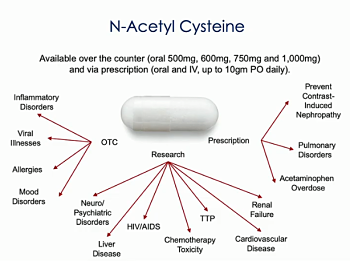N-乙醯半胱氨酸抑制人膀胱癌細胞的增殖、粘附、遷移和侵襲
N-acetylcysteine inhibits proliferation, adhesion, migration and invasion of human bladder cancer cells
J Med Assoc Thai. 2009 Sep;92(9):1171-7.
- PMID: 19772176
Abstract
Objective: Bladder cancer is not only a major public health and economically burden for the patients but also a major clinical impact for Thai urologists. The authors' aim was to study the anti-metastatic effect of N-acetylcysteine (NAC), one of the cheap, safe and widely used over-the-counter-drugs in Thailand, on the human bladder cancer cells.
Material and method: Effects of NAC at various concentrations on the growth, adhesion, migration, and invasion of the human bladder cancer cell line were assessed in vitro.
Results: NAC at the concentrations of 5, 10, 20 and 30 mM could directly and significantly inhibit the growth, adhesion, migration, and invasion of the human bladder cancer cells in a dose-dependent manner The 50% inhibitory concentration (IC50) value for cell viability was 33.33 +/- 0.78 mM. The inhibitory effects on migration, invasion and adhesion properties of the cancer cells were dramatically observed at the concentrations of > or = 10, > or = 20 and > or = 30 mM respectively.
Conclusion: NAC has an anti-metastatic effect on the human bladder cancer cells by inhibiting their growth, adhesion, migration, and invasion properties. This implies the high possibility that the urologists may apply the results to use it intravesically before, during and after the transurethral resection of bladder tumour in addition to its conventional usage by oral and parenteral routes.






 留言列表
留言列表
 線上藥物查詢
線上藥物查詢 